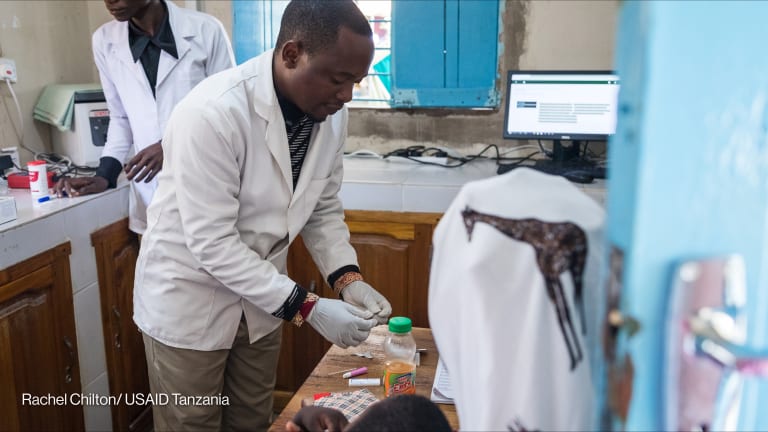
The Ebola crisis has revived a sense of urgency in addressing global health issues, especially when it comes to dealing with acute global health crises and underlying chronic health problems.
HIV and AIDS, tuberculosis, malaria and neglected infectious diseases like dengue, sleeping sickness and leishmaniasis affect more than 1 billion people worldwide. Together, they are responsible for more than 6 million deaths every year — about 685 deaths per hour. They hamper economic and social development and are a crushing burden on health care systems in low- and middle-income countries. While we have made ample progress in the fight against HIV and AIDS, we still don’t have the necessary tools to tackle many other diseases adequately and make rapid diagnostics, treatments and vaccines available to all.
What we need is a concerted, collaborative effort to invest in research and innovation for global health. Current control efforts and levels of investment will not stop the HIV and AIDS, tuberculosis or malaria epidemics, or bring an end to the suffering caused by neglected tropical diseases.
The European & Developing Countries Clinical Trials Partnership and Deutsche Stiftung Weltbevoelkerung — organizations working to advance research on poverty-related diseases and pushing for political leadership to end these diseases once and for all — are convinced that a breakthrough can only be achieved through sustained partnership and collaboration between donors, governments, industry, the research and medical communities, and civil society. The focused collaboration of all stakeholders is crucial not only to control these diseases through existing interventions, but also to encourage innovation in technologies and their delivery, and to foster leadership and set a political agenda which takes these issues seriously.
Partnering for innovation
The conventional competitive approach to drug development has systemically underserved PRDs. A lack of commercial incentive to invest in these diseases led to a “90/10 gap” — only 10 percent of global investment in R&D is spent on diseases that affect 90 percent of the world’s population.
Encouragingly, product development partnerships such as the Drugs for Neglected Diseases Initiative and the Medicines for Malaria Venture have shown in recent years how public-private partnerships can spur innovation in global health. In collaboration with private companies and funders, these nonprofit organizations invest in research, development and access to new health technologies that target diseases disproportionately affecting populations in low- and middle-income countries.
Innovations developed through public-private partnerships and supported by international funders like EDCTP have already ushered in important breakthroughs and led to amendments in important policy guidelines for clinical practice at global level. Recent developments have included more effective and faster tests to diagnose TB, new fast-acting and easy-dosage treatments for malaria and new antiretroviral therapy specifically adapted to meet the needs of children living with HIV and AIDS. However, to sustain and effectively roll out these new technologies, capacity strengthening and knowledge transfer remain key.
Partnering to broaden the research base
Effective partnerships are underpinned by clear goals, common decision-making and, in particular, shared ownership.
For the latter, it is essential that global health solutions are developed in partnership with governments and other stakeholders from low- and middle-income countries. To do this effectively, we need to strengthen the research capacity in endemic countries — not only for conducting clinical trials but also for basic health research and health policymaking.
“North-south” as well as “south-south” research collaborations should be supported and funded by all stakeholders, including the governments of endemic countries. Like several other funders, EDCTP integrates context-driven capacity development in all major projects it funds to pave the way for long-term sustainability and co-ownership of results in the places worst affected by PRDs. Since 2003, EDCTP has brought together researchers from 259 institutions in 30 sub-Saharan African and 16 European countries to collaborate on projects, in addition to training over 500 researchers from Africa and supporting the launch of several pan-African research networks.
Partnering for advocacy
The last decade has borne witness to the powers of partnership in making a mark in international development and advancing global health issues to the top of the political agenda. The work of, for example, the Global Fund to Fight AIDS, Tuberculosis and Malaria, Gavi, the Vaccine Alliance and other global health networks has shown what collaboration can achieve in stimulating national and international political leadership on major global health challenges.
A concerted effort to align research priorities around a common research agenda would give the global health research community a solid, evidenced-based platform to amplify messaging, leverage funds and encourage others to join the fight to put an end to PRDs.
The post-2015 agenda should include an emphasis on the need to invest in innovation and research for global health. DSW, together with civil societies, the private sector and European politicians has started this conversation in Europe. Through the “Let’s Save Lives” campaign, we are raising awareness about what could be achieved in the next decade if we worked together to end the suffering caused by PRDs. As a major funder of clinical research on PRDs, EDCTP acts as a catalyst for achieving important collaboration in this field.
The benefit of working together has never been more obvious nor its need more urgent. At a time when there is pressure to cut back on development assistance and research funding, partnerships have demonstrated that they can advance global health, facilitate the coordination of research worldwide and accelerate technological development, and avoid fragmentation of national policies and programs on PRDs.
As we move into the next era of development cooperation, these partnerships will be key to attaining long-awaited breakthroughs in the fight against PRDs and to improving the health of people in low- and middle-income countries.
Want to learn more? Check out the Healthy Means campaign site and tweet us using #HealthyMeans.
Healthy Means is an online conversation hosted by Devex in partnership with Concern Worldwide, Gavi, GlaxoSmithKline, International Federation of Pharmaceutical Manufacturers & Associations, International Federation of Red Cross and Red Crescent Societies, Johnson & Johnson and the United Nations Population Fund to showcase new ideas and ways we can work together to expand health care and live better lives.









